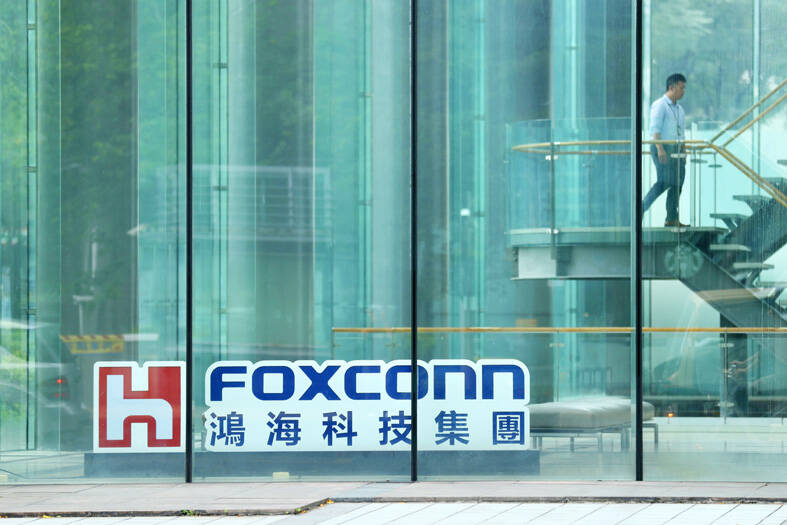IPhone maker Hon Hai Precision Industry Co (鴻海精密) plans to expand its footprint in India with another NT$50 billion (US$1.6 billion) investment for construction projects.
The announcement, made in a Taiwan Stock Exchange filing late yesterday, said the company's subsidiary Foxconn Hon Hai Technology India Mega Development Private Ltd would spend 128.21 billion rupees (US$41.54 billion) to build a new plant to "meet its operational needs."
The filing did not provide any other details. A spokesperson for the company declined to say where the new facilities would be or what they would build.

Photo: EPA
The news comes as Hon Hai, also known as Foxconn Technology Group (富士康科技集團), and other Taiwanese electronics manufacturers continue to diversify their businesses outside of China as tensions rise between Washington and Beijing.
About half of Foxconn’s revenue comes from business with Apple Inc. The company has been making iPhones and other products in India for several years, including the latest iPhone 15. In September, a Foxconn representative in India said on LinkedIn that the Taiwanese company plans to double the size of its business in the South Asian country.
According to Hon Hai's annual report, Foxconn Hon Hai Technology India Mega Development Private Ltd was established in November 2015 and registered at an address in Mumbai, Maharashtra state.
Hon Hai said in May that the subsidiary spent 3 billion Indian rupees to purchase a piece of land located in the industrial hub of Bengaluru in the southern Indian state of Karnataka, which borders Maharashtra.
The subsidiary also spent about US$33.27 million to buy production equipment from Apple Operations Ltd, the company said in July.
India’s Karnataka state government in August announced that Foxconn planned to invest US$600 million on two component factories in the southern Indian state. That included a plant that will make mechanical enclosures for iPhones and a semiconductor equipment manufacturing plant it will operate with Applied Materials Inc, the government said at the time.
Those two projects are on top of a US$700 million facility Foxconn aims to build on a 300-acre (121 hectares) site close to the airport in Bengaluru, the capital of Karnataka, Bloomberg News previously reported. That plant is likely to assemble iPhones.
It was not immediately clear if the latest investment announcement is to cover those projects or additional ones.
Foxconn already operates nine production campuses and more than 30 factories employing tens of thousands of people in India, where it takes in around $10 billion of revenue annually.
Additional reporting by CNA
This story has been updated since it was first published to add more details about the company's Indian subsidiary.

POWERING UP: PSUs for AI servers made up about 50% of Delta’s total server PSU revenue during the first three quarters of last year, the company said Power supply and electronic components maker Delta Electronics Inc (台達電) reported record-high revenue of NT$161.61 billion (US$5.11 billion) for last quarter and said it remains positive about this quarter. Last quarter’s figure was up 7.6 percent from the previous quarter and 41.51 percent higher than a year earlier, and largely in line with Yuanta Securities Investment Consulting Co’s (元大投顧) forecast of NT$160 billion. Delta’s annual revenue last year rose 31.76 percent year-on-year to NT$554.89 billion, also a record high for the company. Its strong performance reflected continued demand for high-performance power solutions and advanced liquid-cooling products used in artificial intelligence (AI) data centers,

SIZE MATTERS: TSMC started phasing out 8-inch wafer production last year, while Samsung is more aggressively retiring 8-inch capacity, TrendForce said Chipmakers are expected to raise prices of 8-inch wafers by up to 20 percent this year on concern over supply constraints as major contract chipmakers Taiwan Semiconductor Manufacturing Co (TSMC, 台積電) and Samsung Electronics Co gradually retire less advanced wafer capacity, TrendForce Corp (集邦科技) said yesterday. It is the first significant across-the-board price hike since a global semiconductor correction in 2023, the Taipei-based market researcher said in a report. Global 8-inch wafer capacity slid 0.3 percent year-on-year last year, although 8-inch wafer prices still hovered at relatively stable levels throughout the year, TrendForce said. The downward trend is expected to continue this year,

Vincent Wei led fellow Singaporean farmers around an empty Malaysian plot, laying out plans for a greenhouse and rows of leafy vegetables. What he pitched was not just space for crops, but a lifeline for growers struggling to make ends meet in a city-state with high prices and little vacant land. The future agriculture hub is part of a joint special economic zone launched last year by the two neighbors, expected to cost US$123 million and produce 10,000 tonnes of fresh produce annually. It is attracting Singaporean farmers with promises of cheaper land, labor and energy just over the border.

US actor Matthew McConaughey has filed recordings of his image and voice with US patent authorities to protect them from unauthorized usage by artificial intelligence (AI) platforms, a representative said earlier this week. Several video clips and audio recordings were registered by the commercial arm of the Just Keep Livin’ Foundation, a non-profit created by the Oscar-winning actor and his wife, Camila, according to the US Patent and Trademark Office database. Many artists are increasingly concerned about the uncontrolled use of their image via generative AI since the rollout of ChatGPT and other AI-powered tools. Several US states have adopted